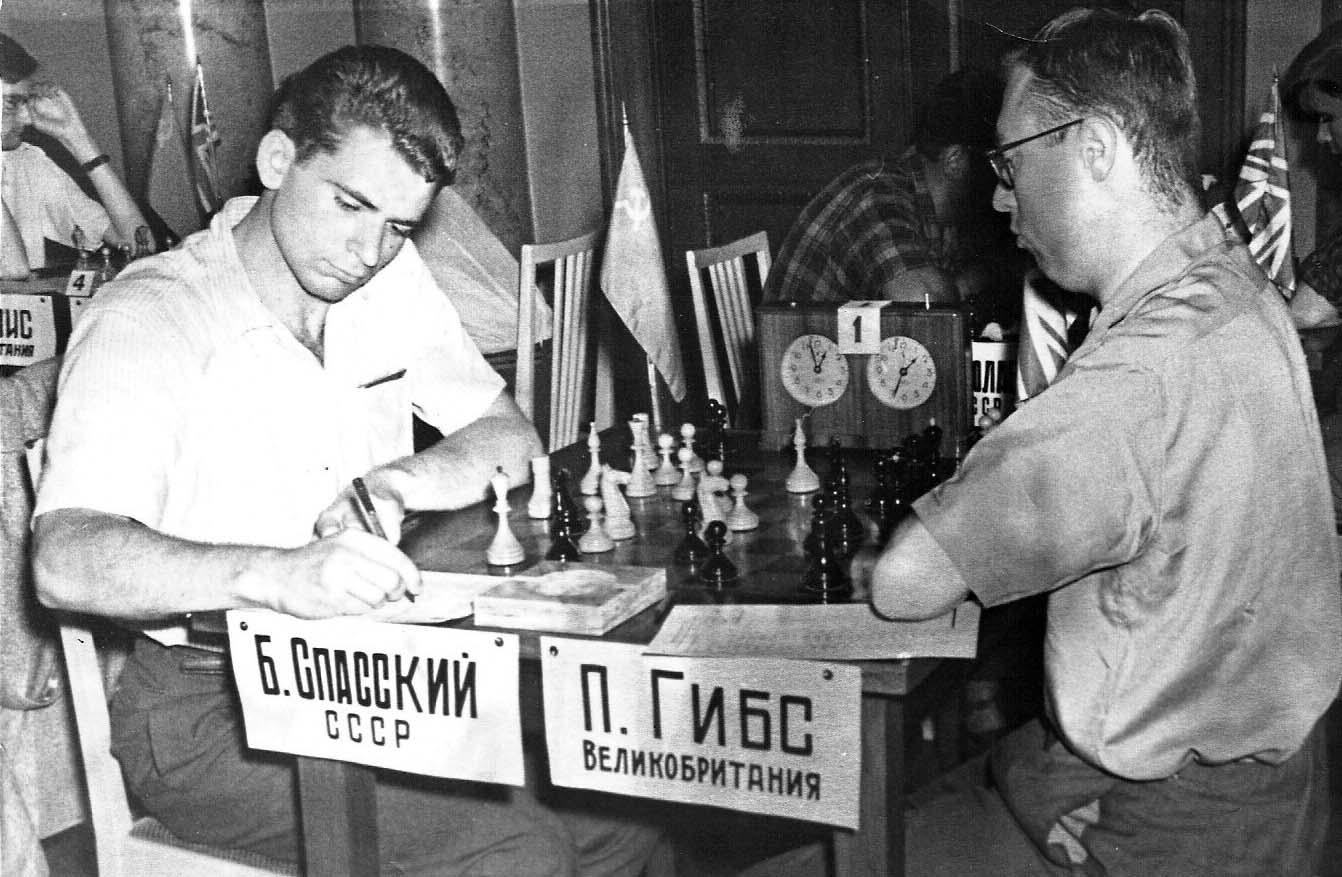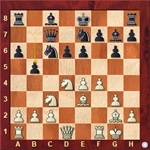Counties Chess
Union
News Archive |
Obituaries
- Peter Gibbs
- Otto Hardy
- Ritson Morry
- Tony Robson
- Dave Rowe
- Roy Woodcock
- Norman Young
Peter Campbell Gibbs 1934-2023
The chess community is much saddened by the news of the death of former MCCU President Peter Gibbs. Peter was educated at Bradford Grammar School and trained as a solicitor. He first came to notice in chess circles when he shared first place in the 1952 British Under-18 Championship with Bernard Cafferty and Peter Sanderson. In 1954 he came second to Bernard Cafferty in the under-21 British Championship and he was British Universities Champion in 1956.

On board 1 at The 1960 World Student Team Championships playing Spassky
He represented England in the World Student Team Chess championships on four occasions between 1954 and 1960 where he played against the world's best players. Between 1955 and 1962 Peter played in the British Championship tournament with a highest finishing place of 6th in 1957.
Following Peter’s appearances in the British Championships, he played in the Britain v The Netherlands match in 1964 where he won both of his games. Peter was for many years a member of Birmingham Chess Club, usually playing board two, below Bernard Cafferty.
Although Peter’s work as a solicitor for the Royal Borough of Sutton Coldfield precluded competing in international events at the highest level, Peter was keen to promote the game and could still beat up-and-coming players such as Tony Miles in 1970. He moved to Burbage in Leicestershire and played for Nuneaton Club and was three time Warwickshire individual champion in 1956, 1966 and 1970. He played board 1 for Leicestershire securing a draw against Keith Arkell in 1978. Peter was also a keen correspondence player winning the 1999-2000 British Veterans Correspondence Championship.
Peter retired from the post of deputy town clerk of Sutton Coldfield in 1974 when local government in England was re-organised. Although he continued as a solicitor working for Hinckley and Bosworth Borough Council, he had more time for chess. He moved to Burbage in Leicestershire and played for Nuneaton Chess Club which became his main club.
Peter did not confine his chess activities to playing. He was a British Chess Federation arbiter and an English Chess Federation accredited coach. He jumped at the chance when in 1967 he was asked to be chess correspondent for the Birmingham Post. Peter was a stalwart for his club, Hinckley and gave simultaneous exhibitions and visited schools to generate local interest. He contributed greatly to the organisation of chess for the Blind and correspondence chess. He helped organise training for Blind players and accompanied the British Braille team when they played abroad. In the field of correspondence chess he was active in committees of the English Federation for Correspondence Chess between 1965 and 2007, a tournament organiser between 2000 and 2011 and donated a trophy for the MCCU individual Correspondence Chess Championship.
Peter’s contributions to the game have been recognised by many chess organisations. He was a Life Vice President of three county associations – Warwickshire, Leicestershire and Yorkshire - and has been President of the Midland Counties Chess Union and the English Federation for Correspondence Chess. He received the British Chess Federation President's award in 1988. He will be much missed within the chess community given his outstanding contributions across so many areas. Ray Dolan, CEO Midland Counties Chess Union writes: "A legend… a gentleman of the game of chess".
Peter is survived by his wife Celia and two children.
Written by Ray Collett with input from Ray Dolan and information from Nigel Towers, Colin Green, Alex Holowczak, John Saunders, and David Thomas.
An illustrative game
Peter Gibbs - Michael Macdonald-Ross. Cheltenham Chess Festival, July 1953
1.e4 c5 2.Nc3 d6 3.g3 g6 4.Bg2 Bg7 5.d3 e6 6.Be3 Ne7 7.Nge2 Nbc6 8.d4 cxd4 9.Nxd4 a6 10.O-O Qc7 11.f4 b5

12.Ndxb5! axb5 13.Nxb5 Qd7 14.Nxd6+ Kf8 15.f5 Bxb2 16.fxe6 Qxe6 17.Rxf7+ Kg8 18.Bh6 Ba6?(18... Bd4+ 19. Qxd4!! Qxf7 20.Qc3 wins: the best move was 18... Qxf7 19. Nxf7 Kxf7 with advantage to white) 19.Qf3 Nf5 20.exf5 Qxd6 21.Qd5 Qxd5 22.Bxd5 Nb4 23.Rf8# 1–0